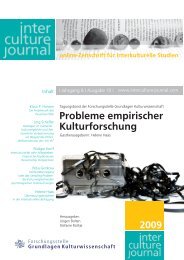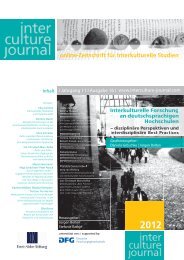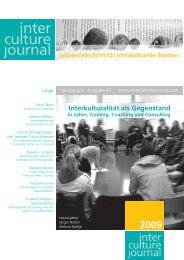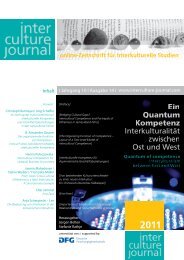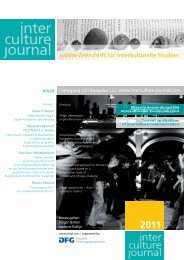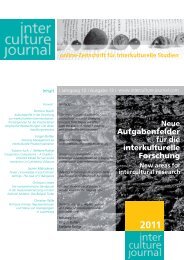Interkulturellen Kompetenz forschung - Frankfurt School of Finance ...
Interkulturellen Kompetenz forschung - Frankfurt School of Finance ...
Interkulturellen Kompetenz forschung - Frankfurt School of Finance ...
Erfolgreiche ePaper selbst erstellen
Machen Sie aus Ihren PDF Publikationen ein blätterbares Flipbook mit unserer einzigartigen Google optimierten e-Paper Software.
Mader / Camerer: International English and the Training <strong>of</strong> Intercultural Communicative Competence<br />
clearly and correctly in English (grammatical mistakes will be<br />
forgiven in most cases) and our knowledge <strong>of</strong> English will not<br />
help us much if our perceptions <strong>of</strong> the words we use differ<br />
because <strong>of</strong> our own or another language. A list <strong>of</strong> critical<br />
language functions for intercultural situations will probably<br />
include the following: first encounters (including body contact),<br />
small talk, instructions, dissenting, criticising, complaining,<br />
finding agreement, convincing, extending / accepting /<br />
refusing invitations, as well as others. All the above will involve<br />
questions <strong>of</strong> social relations, hierarchy, appropriate register,<br />
politeness conventions, non-verbal communication etc.<br />
When dealing with language it is a matter <strong>of</strong> being on the<br />
ball constantly, as the answers will change as language and<br />
the use <strong>of</strong> it changes. How English develops as a lingua<br />
franca will to a great extent be dependent on the first languages<br />
<strong>of</strong> the speakers using it. It is unlikely that we will all<br />
use the language codes which the British or Americans use,<br />
but which language codes will we use? The answer will be<br />
found in the identification <strong>of</strong> language codes in our own languages<br />
as well as those in the languages <strong>of</strong> our interlocutors.<br />
Speakers <strong>of</strong> other languages whose only common language is<br />
English will have to be trained to interpret these. The most<br />
pragmatic answer is to provide learners with the means for<br />
the use <strong>of</strong> a “middle corridor” <strong>of</strong> polite discourse strategies in<br />
English, avoiding both (extravagantly) indirect conventions<br />
typical for some Anglo-Saxon milieus and (overly) direct discourse<br />
to be found in other cultures, among them Germany,<br />
Holland, Poland, Spain etc.<br />
On the other hand, it is probably the skill <strong>of</strong> metacommunication<br />
which plays the most important role, perhaps<br />
particularly because this has so far largely been ignored in<br />
language training. Meta-communication holds the key to the<br />
success or otherwise <strong>of</strong> a great variety <strong>of</strong> communicative<br />
situations in which English as a lingua franca is used. Metalanguage<br />
may be difficult or impossible to employ when<br />
communicating with members <strong>of</strong> some so-called high-context<br />
cultures, but in most intercultural encounters metacommunicative<br />
skills will play an essential role (Byram 1997,<br />
Beneke 1998 and 2000, Mülller-Jacquier 1999 and 2000).<br />
6. Criteria for Intercultural Communicative Competence<br />
A person with limited linguistic competence may be an excellent<br />
communicator in intercultural encounters, and the opposite<br />
may be true as well. So what exactly makes a person an<br />
interculturally competent communicator? The answer is a<br />
combination <strong>of</strong> knowledge, awareness and willingness as<br />
well as ability, expressed in performance. Drawing on relevant<br />
105 © Interculture Journal 2010 | 12



